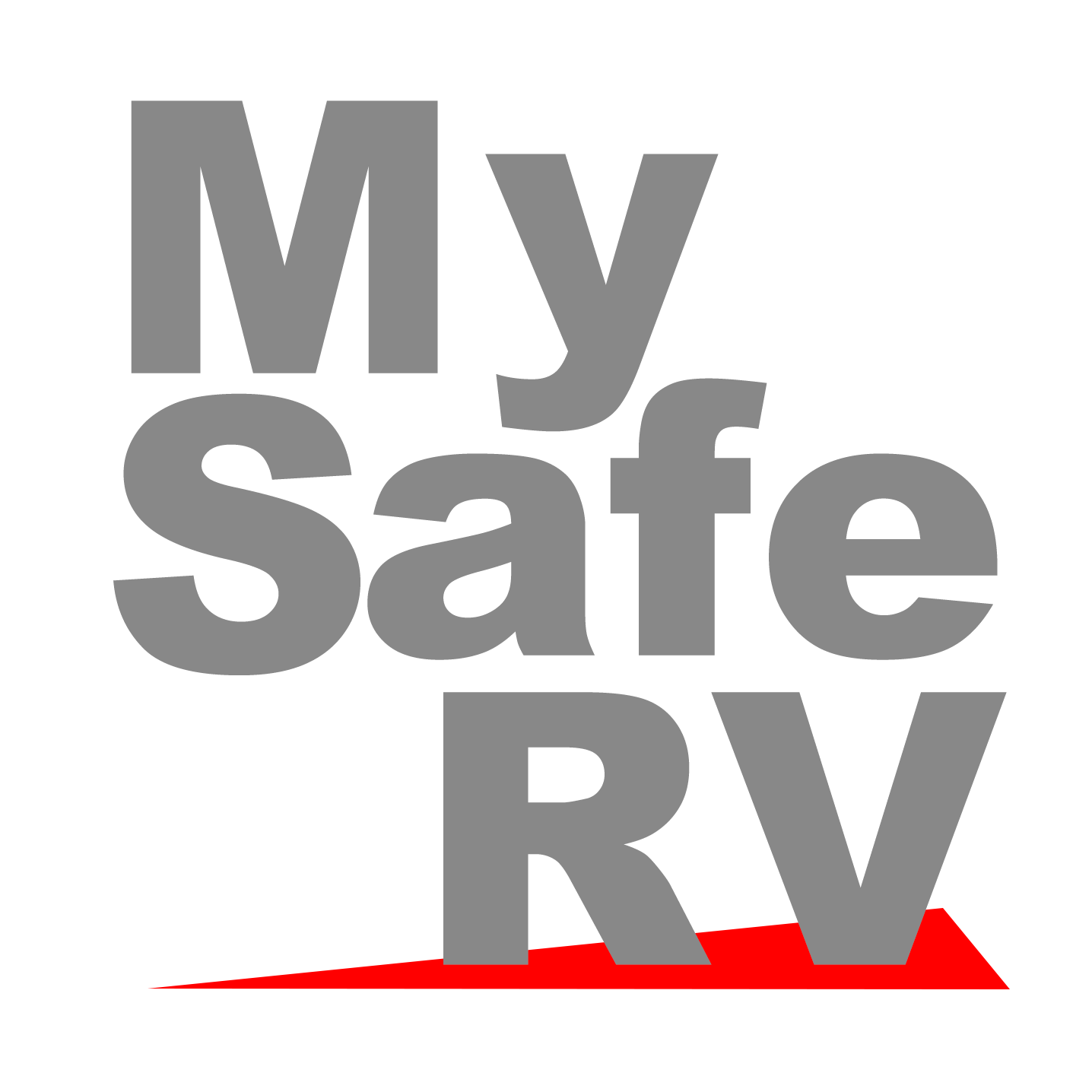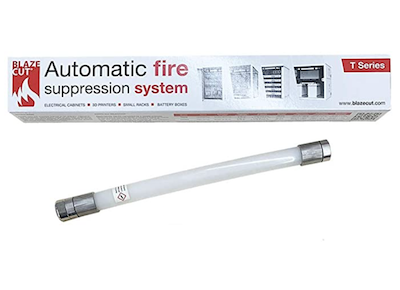RV fridges use either 12 volt DC power, 120 volt AC power, or propane gas which runs an open flame inside the back of your fridge. Did you know this open flame has caused many fires in RVs?
The absorption refrigerator has been used in RVs for decades. It has the ability to operate on 12 volts, 120 volts and even propane gas. Propane is especially useful when you want to boondock and extend your camping trip by reducing the need for electricity.
The risk is that the gas flame in an RV refrigerator can cause a fire, even though it is about the same size as a candle’s flame. In my experience as an RV technician, I have seen evidence small fires that, thankfully, did not spread. In each case, either small leaves or mouse nesting has ignited right where the propane flame is located! These RV owners were saved the loss of their RV due to the fires being contained inside the burn chamber and, with much luck, extinguished itself. There are hundreds of fires each year in RVs caused by propane fires in a refrigerator.
To reduce the risk of any fire from the exposed propane flame, check the back of your refrigerator at least once a year. Before you switch on your fridge, open the lower fridge vent on the outside of your RV or travel trailer. Look for leaves, pine needles, and mouse nest material. Mice gather pieces of paper and other combustable materials that could catch fire from the propane flame. If you see black marks or heat affected areas behind your refrigerator, call your RV technician before operating the fridge.
MySafeRV.com has found a fire extinguisher which may help in the case of fire breaking out in an absorption refrigerator.
This item can be stowed and fastened in the back of your refrigerator compartment. This is easily accessed on the outside of your RV through the lower fridge cooling hatch. Fit this securely with zip ties so that it won’t move when underway. Some cases require the fridge to be removed for installation.
Click here to buy from Amazon.
Heed the warnings!
A post from the RV.net forum:
“I’m here to tell you that my 95 Dutchmen with a Norcold refrigerator burned up in my driveway. We needed to use the refrigerator and I had an electrician coming the next day to install a 30 amp plug-in, so I turned on the propane and started up the refrigerator. All lights came on and I stayed around for about 5 minutes to make sure everything was OK – just like I’ve done hundreds of times while camping. I also have the gas lines checked everytime I had the bearing repacked and the electric brakes checked. Anyway, about 40 minutes after I turned the refrigerator on, I heard a loud boom, and ran outside to see flames shooting about 6 feet out of the roof vent.
If it was going to happen, it was good that it occurred when no one was around it, it wasn’t sitting out in the dry Arizona forest, and I had a ready hose and fire extinguisher. The ignition source appeared to be the refrigerator pilot light. The stove and burners were all in the “off” position. By the time the fire was extinguished, the unit was a total loss.
This happened several months ago, and I am looking for a new TT. I might not sleep very well for awhile in the new TT thinking about what happened. If anyone has an idea how this fire may have occurred, I would appreciate your thoughts. My insurance adjuster said he had found an instance of a Norcold recall to replace a valve that might crack and cause a gas leak. I bought the TT used, so I wasn’t aware if a recall existed. If I can do anything to prevent this possibility in the future, I will.
Thanks,
Ed”
| Responses to this post follow: |
| Posted By: carrothers on 07/26/06 05:36pm |
| “In my case the cause was a propane leak at the junction where the inlet tube goes into the ignition chamber. The fire investigator hypothesises that when I had the propane tank filled earlier that day that they “over pressurized” the system and caused this fitting to leak. I smelled the propane 10 hours after it was filled when we stopped for the night but couldn’t find any sign of where it was leaking, and chalked it up to “heat buildup that afternoon and some venting”….the next morning I couldn’t smell anything so I started up the coach and drove about a half mile to a truck stop for gasoline when the refrigerator caught on fire. Fortunately, two truck drivers flagged me down about 30 feet short of the fuel island and I was able to extinguish the blaze with a fire extinguisher. My propane detector (which is operational) never went off, as the fumes were very light and most likely not detectable. I will be installing a propane detector at the rear of the refrigerator when the shop finishes the repair work. It has been in the shop for about six weeks currently.” |
| Posted By: S. Lee on 07/26/06 05:06pm |
| “I just joined and this is my first post. I joined for this topic specifically. We experienced a fridge fire on tthe May long weekend. It was our first time out with our new-used trailer. We had just upgraded from a 1979 travelaire 13′ bumper hitch to a 90 26′ travelaire. Unfortunately, it had a fridge in it that didn’t have the update done. All I can say is thank God it caught fire in the middle of the afternoon instead of at night when we were sleeping. It was a hard lesson for us to learn. On the plus side, we wound up getting a 99 Jayco 255BH after we settled with the insurance.” |
| Posted By: Kiryza on 08/14/06 07:16am |
| “Have a 2000 Bounder. Had similiar problem. Unhook from power and within 10 minutes of switching to propane the refer caught on fire. Only burned the drain hose and wiring in the back. Thank goodness I was hooking up the toad. When I checked the unit the flame was leaking out of the firebox. Took it in to have it looked at and no one seems to know why but the dealers have seen the problem. Have never heard back from Dometic regarding my inquires.” |
| Posted By: campnis4us on 06/22/06 06:22pm |
| “I am another one that can testify to our refrigerator catching fire. It was 8 years old and we were 2 hours into our journey home from vacation when we stopped to grab a burger. We had only been in the resturant less than 5 minutes when someone walked in and asked who had the camper parked at the side as it was on fire. The fire dept. was dispatched, we used the extingisher and put it out but let them take the entire unit out just to make sure that everything was out. They determined that the wiring had become pinched,etc. and had burned the wood underneath. I must say we do NOT pull with the refrig. on any more. You only have to have this happend once to know that you couldn’t feel comfortable doing this agian.” |
Do what you can to prevent this happening to you!
I hear of people driving with fridges running on propane all the time. Please take it from a certified master RV tech trained by the factories … do not leave your fridge running on propane while driving or towing an RV.
When I am traveling, I always switch off my RV fridge. I have traveled the USA mainland states, and even after traveling all day with the fridge switched off, I still have frozen food in the freezer and still have plenty of cold things in the lower fridge. You may want to freeze items like fish and meat the day before, but most of the things in the lower section of the fridge will last. Fruits, vegetables, sauces and most things last all day without running the fridge. If you have a strong supply of 12 volt power and your fridge can run on 12 volts, then run your fridge while driving or towing. If you have an inverter system, run your fridge on 120 volts. Just don’t run your fridge on propane and drive or tow.
Freeway tunnels are signposted, “Turn off your propane tanks”. Why? Because there is a larger risk of fire when traveling in your RV with propane open. Bumps can loosen connections, 12 volt wiring can spark and there goes the fire!
MySafeRV.com provides this information for recommendations on how you may protect your RV and for your personal safety. MySafeRV.com and its authors are not able to guarantee these safeguards will always prevent or extinguish a fire. This information is a guide to reduce the risk of fire.

